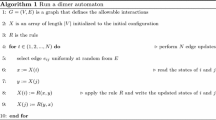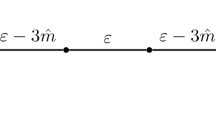Abstract
We consider a multidimensional model of opinion dynamics in social networks. Within the framework of the model, the dynamics of two interconnected information processes in a social network is studied. The first process is the process of spreading of the excitation in the network of agents and their actions observed from outside (e.g., in the form of messages posted in social media). The second process, which has a connection with the first, is the formation of agents’ opinions (which are a characteristic of their internal state). We demonstrate that the proposed model of opinion dynamics is flexible and allows taking into account the significant effects of opinion formation in social networks, including consensus or agreement of opinions, preservation of differences in agents’ opinions, and even polarization of opinions. We propose approaches to measuring the polarization of opinions and present simulation results. We show that the proposed polarization index for a network allows one to distinguish and evaluate situations with meaningfully different multidimensional distributions of opinions in a social network as well as to find directions of the greatest polarization.







Similar content being viewed by others
REFERENCES
Chkhartishvili, A.G., Gubanov, D.A., and Novikov, D.A., Social Networks: Models of Information Influence, Control and Confrontation, Cham, Switzerland: Springer Int. Publ., 2019.
De Groot, M.H., Reaching a consensus, J. Am. Stat. Assoc., 1974, no. 69, pp. 118–121.
Kozitsin, I.V. and Belolipetskii, A.A., Opinion convergence in the Krasnoshchekov model, J. Math. Sociol., 2019, vol. 43, no. 2, pp. 104–121.
Myers, D.G., Social Psychology, New York: McGraw-Hill, 1999.
Deffuant, G., Neau, D., Amblard, F., and Weisbuch, G., Mixing beliefs among interacting agents, Adv. Complex Syst., 2000, vol. 03, pp. 87–98.
Parsegov, S.E., Proskurnikov, A.V., Tempo, R., and Friedkin, N.E., Novel multidimensional models of opinion dynamics in social networks, IEEE Trans. Autom. Control, 2017, vol. 62, no. 5, pp. 2270–2285.
Friedkin, N.E., Proskurnikov, A.V., Tempo, R., and Parsegov, S.E., Network science on belief system dynamics under logic constraints, Science, 2016, vol. 354, no. 6310, pp. 321–326.
Altafini, C., Consensus problems on networks with antagonistic interactions, IEEE Trans. Autom. Control, 2014, vol. 58, no. 4, pp. 935–946.
Petrov, A. and Proncheva, O., Modeling propaganda battle: decision-making, homophily, and echo chambers, Conf. Artif. Intell. Nat. Lang. (2018), pp. 197–209.
Sirbu, A., Pedreschi, D., Giannotti, F., and Kertész, J., Algorithmic bias amplifies opinion fragmentation and polarization: a bounded confidence model, PLOS ONE, 2019, no. 3(14), pp. e0213246–. https://doi.org/10.1371/journal.pone.0213246
Chkhartishvili, A.G. and Gubanov, D.A., A conceptual approach to online social networks analysis, Autom. Remote Control, 2015, vol. 76, no. 8, pp. 1455–1462.
Chkhartishvili, A.G. and Gubanov, D.A., Influence levels of users and meta-users of a social network, Autom. Remote Control, 2018, vol. 79, no. 3, pp. 545–553.
Hegselmann, R. and Krause, U., Opinion dynamics and bounded confidence models, analysis and simulation, J. Artif. Soc. Social Simul., 2002. vol. 5. no. 3.
Hegselmann, R. and Krause, U., Opinion dynamics under the influence of radical groups, charismatic leaders, and other constant signals: a simple unifying model, Networks Heterog. Media, 2015, vol. 10, no. 3, pp. 477–509.
Jager, W. and Amblard, F., Uniformity, bipolarization and pluriformity captured as generic stylized behavior with an agent-based simulation model of attitude change, Comput. & Math. Org. Theory, 2005, vol. 10, no. 4, pp. 295–303.
Maes, M. and Bischofberger, L., Will the Personalization of Online Social Networks Foster Opinion Polarization?, 2015. Available at SSRN 2553436.2015.
Takács, K., Flache, A., and Mäs, M., Discrepancy and disliking do not induce negative opinion shifts, PLOS ONE, 2016, vol. 11, no. 6, p. e0157948.
Gentzkow, M., Polarization in 2016, in Toulouse Network for Information Technology Whitepaper, 2016.
Abramowitz, A.I. and Saunders, K.L., Is polarization a myth?, J. Polit., 2008, vol. 70, no. 2, pp. 542–555.
Esteban, J.-M. and Ray, D., On the measurement of polarization, Econ. J. Econ. Soc., 1994, vol. 62, no. 4, pp. 819–851.
Aleskerov, F.T. and Golubenko, M.A., On the evaluation of a symmetry of political views and polarization of society. Working paper WP7/2003/04, Preprint of Higher School Econ., Moscow, 2003.
Gubanov, D.A. and Petrov, I.V., Multidimensional model of opinion polarization in social networks, in Proc. 12th Int. Conf. “Management of Large-Scale System Development” (MLSD), Moscow: IEEE, 2019, pp. 1200–1202. https://ieeexplore.ieee.org/document/8910967
Funding
This work was supported by the Russian Foundation of Basic Research, project no. 18-29-22042.
Author information
Authors and Affiliations
Corresponding authors
Additional information
Translated by V. Potapchouck
Rights and permissions
About this article
Cite this article
Gubanov, D.A., Petrov, I.V. & Chkhartishvili, A.G. Multidimensional Model of Opinion Dynamics in Social Networks: Polarization Indices. Autom Remote Control 82, 1802–1811 (2021). https://doi.org/10.1134/S0005117921100167
Received:
Revised:
Accepted:
Published:
Issue Date:
DOI: https://doi.org/10.1134/S0005117921100167




